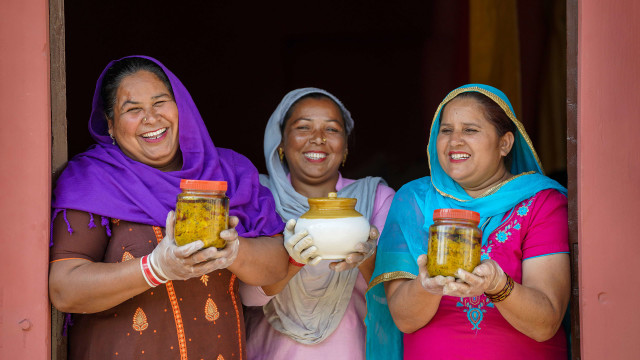Spending Wisely on Things We Love

Back in 1985, when I was studying engineering at IIT-Delhi, I went to Mumbai for my internship. It used to be hot and humid. We would go to Marine Drive after office and have a soda or two; I used to be out of cash, so over some time, I incurred a debt of Rs 50 to a colleague turned friend. When I came back to Delhi, my father came to pick me up at the railway station. My friend was with me, and I told dad I owed him Rs 50, so could he please pay him. His jaw dropped — Rs 50 was a lot of money back then. He had invested in giving me and my sister a good life, an education, and he didn’t have that kind of money to spare for his son’s frivolous spending.
This was probably my first real lesson on the value of money and how we need to be wise and spend on things we truly love.
Money might be what money does, but it’s essential to our financial wellbeing. A pillar of Wholistic Wellbeing, financial wellbeing refers to a state of security, control, and personal empowerment over our wealth and earnings, endowing us with the financial agency to reach our goals. Financial wellbeing is not limited to having a steady income (though that certainly helps), it’s about wealth in the largest sense. “Wealth gives you choice,” explained the American economist Darrick Hamilton in a 2017 speech to the National Economic Association. “It provides the economic security to take risks and shield against financial loss.” Wealth allows people to innovate and try new things, like launching a business, as well as invest and grow a portfolio of assets over time. It also encompasses the money we might inherit or returns on investments. It allows us to save for our old age and our families and provide them with a good, comfortable life, during and after our lifetime.
These are all important things, though some are more essential than others. But it’s not in terms of wants vs. needs that I wish to frame the conversation today. Instead, I want to think about spending wisely on things we love.
Take stock of how you spend
What do you typically spend your money on every month? I imagine food, transportation, utilities bills, insurance, rent, car or home loan EMIs, travel and holidays. Maybe you live abroad and spend travel fare to visit your home country to see your family and friends annually. Then, there are nights when you treat yourself to a dinner out, a movie or the theatre, or pop into a shop to buy a new dress, a suit, or a pair of shoes. Some might also spend money on a gym membership, a yoga class, or in pursuing a creative passion. There are endless ways to spend.
Perhaps you’re also saving some money — to buy a house, for your retirement, or for your children’s education. Balancing what we earn and save with what we spend takes willpower and long-term vision, especially when we never know what life might throw our way.
It makes sense to start your “spending wisely” journey by taking stock of how you spend your money, and what on. Maintain a diary or an Excel of your monthly expenses. Categorize spending into essentials, non-essentials, good-to-have, and luxuries. Set spend limits and saving mandates for yourself and keep track of your spending week on week. Of course, you’re allowed the occasional treat of a fancy holiday or a luxury car but let those be far and few between — you must feel you’ve “earned” the treat. How we acquire wealth is often a complex and multifold journey, and so too is how we spend it.
Learn to understand what you truly love
To spend wisely on things you love and not as per fads, trends, and whims, you first need to understand what it means to truly love something. We often confuse what we think we love with what we really love.
Learning to love truly is a skill that requires patience, practice, and mindfulness. Ask yourself honestly — what brings you lasting joy? What makes you feel most content? The next time you go to the supermarket and spot a packet of chips in the discount aisle, ask yourself: do you really love chips? Or do you simply enjoy the short-term satisfaction of a tasty and crunchy bargain? Chances are, you don’t actually love chips; they bring you momentary pleasure without lasting gains. We’re more likely to love roasted vegetables, which are not only healthier, but also remind us of jovial family occasions like Christmas or Thanksgiving.
When it comes to clothing, it’s a good idea to ponder whether you really love the latest trend: will the shoes of the moment pair nicely with your pre-existing wardrobe, and will the fit and quality outlast the trend? Think about shopping less, and of spending more wisely on clothes that will stand the test of time; that are produced to high ethical and environmental standards.
As with food, learn to buy not as per impulse, but according to the stories and meaning behind clothes. The next time you spot a nice cardigan in a shop, ask yourself: what journey has this cardigan been on? Where was it designed, produced, manufactured and sown? What narrative do you want to wear on your sleeve? This way, you will get to know and understand your choices better, and by extension, your place in the world as you participate in a cycle of consumption. By spending wisely on things we love, we ensure that our place in the world is stable and ethical.
Spend in line with your values
To spend wisely is also to align our ethics with our consumption habits: it makes no sense, for example, to avoid eating meat or fish out of respect for animal life while buying clothes made of leather, suede, or fur. Keeping our ethics consistent across the spending board is essential to fostering a sense of inner peace, groundedness, and gratitude.
To spend in line with our values is not always easy, given that sustainable clothes and fairtrade organic foods are more expensive than others. But there are neat ways to help us maintain the financial capital we need to give us agency and autonomy over such decisions; most notably, impact investing. By investing in something worth living for — renewable energy or other sustainability initiatives — we can safeguard and grow our wealth in line with our values and thus empower ourselves financially to spend money wisely and ethically.
Finally, it’s important to consider spending on others, as well as supporting programs that aim to reduce the wealth gap and help the underprivileged. Kindness begets kindness and doing a good deed can elevate not only the recipients of a financial donation, but also bring happiness to the benefactors. And there are few things we love more, deep down, than the thought of coming together with our friends and loved ones to improve each other’s lives out of a desire for collective happiness.
Love not the act of spending, but when you spend, do it with consciousness of the things you really love.



